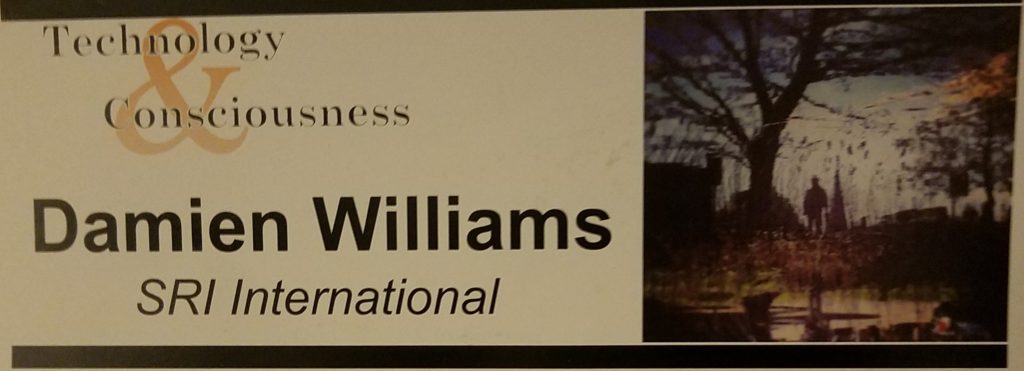Every so often, I think about the fact of one of the best things my advisor and committee members let me write and include in my actual doctoral dissertation, and I smile a bit, and since I keep wanting to share it out into the world, I figured I should put it somewhere more accessible.
So with all of that said, we now rejoin An Imagined and Incomplete Conversation about “Consciousness” and “AI,” Across Time, already (still, seemingly unendingly) in progress:
René Descartes (1637):
The physical and the mental have nothing to do with each other. Mind/soul is the only real part of a person.
Norbert Wiener (1948):
I don’t know about that “only real part” business, but the mind is absolutely the seat of the command and control architecture of information and the ability to reflexively reverse entropy based on context, and input/output feedback loops.
Alan Turing (1952):
Huh. I wonder if what computing machines do can reasonably be considered thinking?
Wiener:
I dunno about “thinking,” but if you mean “pockets of decreasing entropy in a framework in which the larger mass of entropy tends to increase,” then oh for sure, dude.
John Von Neumann (1958):
Wow things sure are changing fast in science and technology; we should maybe slow down and think about this before that change hits a point beyond our ability to meaningfully direct and shape it— a singularity, if you will.
Clynes & Klines (1960):
You know, it’s funny you should mention how fast things are changing because one day we’re gonna be able to have automatic tech in our bodies that lets us pump ourselves full of chemicals to deal with the rigors of space; btw, have we told you about this new thing we’re working on called “antidepressants?”
Gordon Moore (1965):
Right now an integrated circuit has 64 transistors, and they keep getting smaller, so if things keep going the way they’re going, in ten years they’ll have 65 THOUSAND. :-O
Donna Haraway (1991):
We’re all already cyborgs bound up in assemblages of the social, biological, and techonological, in relational reinforcing systems with each other. Also do you like dogs?
Ray Kurzweil (1999):
Holy Shit, did you hear that?! Because of the pace of technological change, we’re going to have a singularity where digital electronics will be indistinguishable from the very fabric of reality! They’ll be part of our bodies! Our minds will be digitally uploaded immortal cyborg AI Gods!
Tech Bros:
Wow, so true, dude; that makes a lot of sense when you think about it; I mean maybe not “Gods” so much as “artificial super intelligences,” but yeah.
90’s TechnoPagans:
I mean… Yeah? It’s all just a recapitulation of The Art in multiple technoscientific forms across time. I mean (*takes another hit of salvia*) if you think about the timeless nature of multidimensional spiritual architectures, we’re already—
DARPA:
Wait, did that guy just say something about “Uploading” and “Cyborg/AI Gods?” We got anybody working on that?? Well GET TO IT!
Disabled People, Trans Folx, BIPOC Populations, Women:
Wait, so our prosthetics, medications, and relational reciprocal entanglements with technosocial systems of this world in order to survive makes us cyborgs?! :-O
[Simultaneously:]
Kurzweil/90’s TechnoPagans/Tech Bros/DARPA:
Not like that.
Wiener/Clynes & Kline:
Yes, exactly.
Haraway:
I mean it’s really interesting to consider, right?
Tech Bros:
Actually, if you think about the bidirectional nature of time, and the likelihood of simulationism, it’s almost certain that there’s already an Artificial Super Intelligence, and it HATES YOU; you should probably try to build it/never think about it, just in case.
90’s TechnoPagans:
…That’s what we JUST SAID.
Philosophers of Religion (To Each Other):
…Did they just Pascal’s Wager Anselm’s Ontological Argument, but computers?
Timnit Gebru and other “AI” Ethicists:
Hey, y’all? There’s a LOT of really messed up stuff in these models you started building.
Disabled People, Trans Folx, BIPOC Populations, Women:
Right?
Anthony Levandowski:
I’m gonna make an AI god right now! And a CHURCH!
The General Public:
Wait, do you people actually believe this?
Microsoft/Google/IBM/Facebook:
…Which answer will make you give us more money?
Timnit Gebru and other “AI” Ethicists:
…We’re pretty sure there might be some problems with the design architectures, too…
Some STS Theorists:
Honestly this is all a little eugenics-y— like, both the technoscientific and the religious bits; have you all sought out any marginalized people who work on any of this stuff? Like, at all??
Disabled People, Trans Folx, BIPOC Populations, Women:
Hahahahah! …Oh you’re serious?
Anthony Levandowski:
Wait, no, nevermind about the church.
Some “AI” Engineers:
I think the things we’re working on might be conscious, or even have souls.
“AI” Ethicists/Some STS Theorists:
Anybody? These prejudices???
Wiener/Tech Bros/DARPA/Microsoft/Google/IBM/Facebook:
“Souls?” Pfffft. Look at these whackjobs, over here. “Souls.” We’re talking about the technological singularity, mind uploading into an eternal digital universal superstructure, and the inevitability of timeless artificial super intelligences; who said anything about “Souls?”
René Descartes/90’s TechnoPagans/Philosophers of Religion/Some STS Theorists/Some “AI” Engineers:
…
[Scene]
Read more of this kind of thing at:
Williams, Damien Patrick. Belief, Values, Bias, and Agency: Development of and Entanglement with “Artificial Intelligence.” PhD diss., Virginia Tech, 2022. https://vtechworks.lib.vt.edu/handle/10919/111528.




